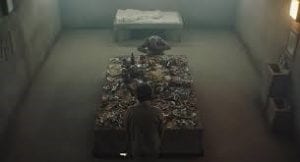Up The Down Elevator
The Platform is streaming on Netflix now.
 It’s hard enough for a quality film to break through to audiences under normal circumstances. The Motion Picture Association of America tells us that, despite the usual fluctuations, an average of 600 movies are released yearly. Of that number, some of them have advantages. Major studio backing and a multimillion-dollar marketing campaign can get a film a hell of a lot closer to the finish line of profitability, regardless of its actual quality.
It’s hard enough for a quality film to break through to audiences under normal circumstances. The Motion Picture Association of America tells us that, despite the usual fluctuations, an average of 600 movies are released yearly. Of that number, some of them have advantages. Major studio backing and a multimillion-dollar marketing campaign can get a film a hell of a lot closer to the finish line of profitability, regardless of its actual quality.
But, as you’ve probably noticed, we’re a country mile past “normal” these days. Going to the movies is very much not so much, and when we’re not taking part in sadistic gladiatorial matches for rolls of Charmin, we’re trying to block out the slow-motion horror unfolding at daily White House briefings.
When things get tense, seeking out cinematic comfort food* is an understandable reaction. Comfort food isn’t meant to be eaten constantly, and sooner or later we need to eat something that’s a) healthy b) outside the normal routine and c) both. Movies that are easy to digest are no different. We’ve all got time on our hands, and spending a little bit of that time taking a risk ain’t gonna kill you.**
If I told you about a film that examines class warfare and it’s in a foreign language, you might retreat further into your blankets or proudly exclaim, “I’ve got you beat! I already saw Parasite!” The film I have in mind does all that plus a heaping helping of gut-wrenching tension, gore, and clever filmmaking. Please do me a favor and start streaming The Platform at your earliest convenience.
 Goreng (Ivan Massague) awakens to find himself in prison. This prison isn’t the usual affair with six by eight-foot cells, gray brick walls, and a steel door. It isn’t even a regular movie prison featuring snarling inmates throwing flaming rolls of toilet paper and vicious guards pummeling anybody within reach. This prison is different, and it’s known as The Hole.
Goreng (Ivan Massague) awakens to find himself in prison. This prison isn’t the usual affair with six by eight-foot cells, gray brick walls, and a steel door. It isn’t even a regular movie prison featuring snarling inmates throwing flaming rolls of toilet paper and vicious guards pummeling anybody within reach. This prison is different, and it’s known as The Hole.
The wall is marked with the number 48. Goreng can’t help but notice the massive hole in both the floor and the ceiling, and when he screams for help to the people above and below, they won’t answer him. On the other side of the cell is Trimagasi (Zorion Eguileor), his cellmate, an older man who knows things – obviously. Each inmate is allowed to bring one object. Goreng has brought an old copy of Don Quixote, while Trimagasi has a self-sharpening knife.
Trimagasi explains the rules. Once per day, a platform descends and stops on each floor. When it begins its descent, the platform is filled with a dazzling variety of foods and beverages. Inmates have two minutes to eat as much or as little as they like before the platform resumes its downward journey. Those on lower floors only eat the leftovers of those from the top. Hoarding is strictly prohibited, and if an inmate sneaks an apple for later, the temperature is adjusted on their floor to lethal temperatures.
 Making things stranger is the fact that every month, the prisoners are knocked unconscious by gas and moved to different levels. What function does the prison serve, or does it simply serve itself? Goreng will have to get to the bottom of things, both figuratively and literally. He’ll also have to deal with Miharu (Alexandra Masangkay), a silent woman with eyes like a sniper who searches for her son, Imoguiri (Antonia San Juan), a former employee of The Hole, and Baharat (Emilio Buale) a man looking for something to believe in.
Making things stranger is the fact that every month, the prisoners are knocked unconscious by gas and moved to different levels. What function does the prison serve, or does it simply serve itself? Goreng will have to get to the bottom of things, both figuratively and literally. He’ll also have to deal with Miharu (Alexandra Masangkay), a silent woman with eyes like a sniper who searches for her son, Imoguiri (Antonia San Juan), a former employee of The Hole, and Baharat (Emilio Buale) a man looking for something to believe in.
The Platform is one of those movies you tell your friends about, one of those films featuring the fiendish intelligence and boundless creativity that seems to be so often lacking in blockbusters. For director Galder Gaztelu-Urrutia, that creativity came from years of experience as a producer and as a director of two shorts. A modest budget meant that Gaztelu-Urrutia was forced to reuse sets. Much like 1997’s Cube, his film never looks chintzy. Instead, he’s created a brutalist feel that dwarfs the characters, making their decisions feel even more petty, more monstrous, and more unlikely.
Speaking of creativity, screenwriters Pedro Rivero and David Desola do a great deal with a little. They’re starting with the concept that if the fortunate didn’t take more than their fair share of food, there would be enough for everyone. From there, the screenplay twists and turns in a number of directions, reflecting different aspects of society and human nature. Those who have spent a great deal of time on lower levels become even more ruthless when they ascend to upper levels. They know what they have to lose.
 I liked the performances across the board, yet two stuck out to me. As Goreng, Ivan Massague travels across the emotional spectrum in his performance, and he does so naturally. Goreng experiences horror, savagery, idealism, compassion, and moments of sly humor. I also thoroughly enjoyed the performance of Zorion Eguileor as Trimagasi. He’s playing one of those regular guys you might chat with at the bar or at your kid’s ball game, the type who thinks he’s a little more in the know than everyone else and is a little more willing than most to surrender to his baser nature.
I liked the performances across the board, yet two stuck out to me. As Goreng, Ivan Massague travels across the emotional spectrum in his performance, and he does so naturally. Goreng experiences horror, savagery, idealism, compassion, and moments of sly humor. I also thoroughly enjoyed the performance of Zorion Eguileor as Trimagasi. He’s playing one of those regular guys you might chat with at the bar or at your kid’s ball game, the type who thinks he’s a little more in the know than everyone else and is a little more willing than most to surrender to his baser nature.
Look, I get it. Outside our windows is chaos. Uncertainty. Tension. What’s the point of watching something scary as hell when life is scary as hell? To that I’ll respond with: take a chance. The Platform is smart, scary, and has so very much to say. It’s the kind of film that shouldn’t be ignored.
*We’re certainly doing that, and my kid announced yesterday that for the duration of the pandemic, we’ll be watching the entirety of the Marvel Cinematic Universe in chronological order.
**Unless you’re planning on having the kids take part in a coronavirus party, in which case it just might kill you! Who would be dumb enough to take part in something so foolish? Click here to learn who you should avoid like the…well, you know.






